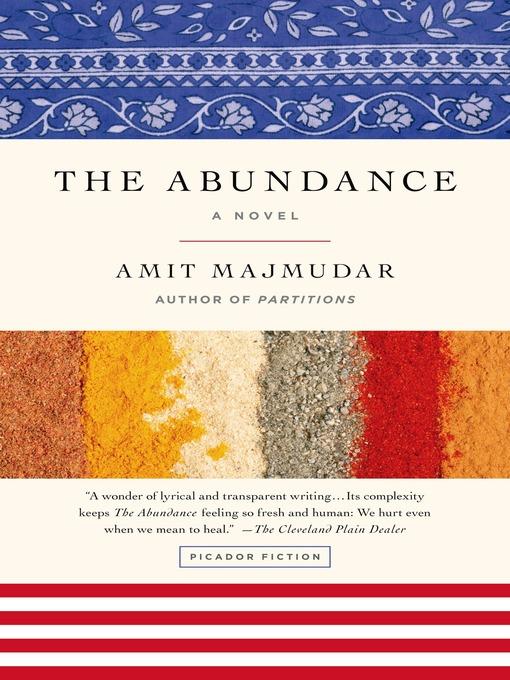
The Abundance
A Novel
کتاب های مرتبط
- اطلاعات
- نقد و بررسی
- دیدگاه کاربران
نقد و بررسی

January 28, 2013
Majmudar (Partitions) returns with a moving story of motherhood across cultural divides. After Mala and Ronak’s mother tells them she has been diagnosed with cancer, the center of their world shifts from their own children and spouses and back to the woman who raised them. Their mother fears the change her illness will bring, not only to her body but also to the family’s comfortable routine. She realizes some good might result, though, when Mala unexpectedly decides to learn how to cook the Indian meals she ate as a child. During the hours they spend together making dahi and rotli, Mala and Ronak’s mother (never given her own name) muses upon watching them grow up and mature, from struggling as the children of immigrants in the Midwest to becoming parents themselves. Majmudar’s precise dialogue saves the novel from its few moments of sentimentality and makes the theme of the divide between immigrant parent and first-generation children seem surprisingly fresh. Powerful in its simplicity and honesty, The Abundance reminds us of the way our roots inevitably shape our adult selves. Agent: Georges Borchardt, the Georges Borchardt Literary Agency.

Starred review from December 15, 2012
A mother's terminal illness reveals fault lines as well as enduring bonds in an Indian-American family. Majmudar's magnificent fiction debut, Partitions (2011), investigated the wrenching moral dilemmas posed by the partition of India and Pakistan in 1947; here, he trains the same unsparing yet compassionate eye on a contemporary family in the Midwest. His unnamed narrator, recently diagnosed with cancer, has made her husband, Abhi, promise not to tell their children and grandchildren until after Christmas. "I did not want the spotlight of their concern," she confides. "The idea embarrassed me." Ever since she flunked the exam for foreign medical graduates, she has asserted her self-worth by caring for others, particularly with the traditional Indian food she takes pride in preparing--and subtly nags daughter Mala for not making for her own children. Son Ronak, who married a Caucasian and calls and visits far less than dutiful Mala, gets much more hands-off treatment, which has not escaped the notice of his infuriated sister. Yet, as the story progresses and the narrator weakens, we see the profound love that unites the family. Mala, a stressed-out doctor who previously had "no respect for the art...[that] smacked of Old World female subservience," asks her mother to teach her how to cook; their contentious relationship softens over the spices, and by the following Thanksgiving, Mala is making the entire holiday meal, assisted by Ronak's wife, Amber. The accumulated grievances of decades still erupt from time to time, but they are mostly subsumed by the simple, basic knowledge that the narrator has very little time left. She allows only occasional glimpses of the grim particulars, such as having fluids drained from her cancer-swollen belly. "This is not a book about dying," she informs us. "This is a book about life." Indeed it is, and not life airbrushed by sentimentality, but life as it is actually experienced by flawed human beings--perfectly rendered by their gifted author. Beautifully written and deeply moving.
COPYRIGHT(2012) Kirkus Reviews, ALL RIGHTS RESERVED.

October 15, 2012
Mala and Ronak are surprisingly less comfortable with their dual Indian and American roots than their parents, part of an immigrant community that has happily embraced the New World. Told that their mother is about to die, they return home to the Midwest, where Mala persuades Ronak that they should immerse themselves in Indian culture by learning to cook their mother's favorite recipes. Then Ronak hits upon the idea of capturing their experience in book and film, and all hell breaks loose. Majmudar's Partitions was among Kirkus's best debut novels and Booklist's best works of historical fiction of 2011, which bodes well for this new novel.
Copyright 2012 Library Journal, LLC Used with permission.

February 15, 2013
This heartbreakingly lovely novel evocatively captures the often contentious but ultimately loving essence of a cross-generational Indian American family. Steeped in traditional Indian culture and customs while at the same time embracing their prosperous American lifestyle, the parental protagonists are often at odds with their more thoroughly westernized adult offspring. When they learn their mother is dying, physician Mala and investment banker Ronak return home, embarking on a family project revolving around that staple of the fictional memoir: food. As she teaches her formerly reluctant daughter the timeless art of ethnic Gujarati cuisine, the unnamed narrator copes with her physical deterioration by mentally unfurling her past. Meanwhile, new bonds are forged and old ones are strengthened as the family dynamic necessarily shifts. Majmudar, author of the highly regarded Partitions (2011), displays an understated flair for imagery and language, communicating the significance of the ties that bind without ever resorting to mawkish sentimentality. Delectable and convincing literary fiction that subtly shines the spotlight on some basic universal truths.(Reprinted with permission of Booklist, copyright 2013, American Library Association.)

























دیدگاه کاربران